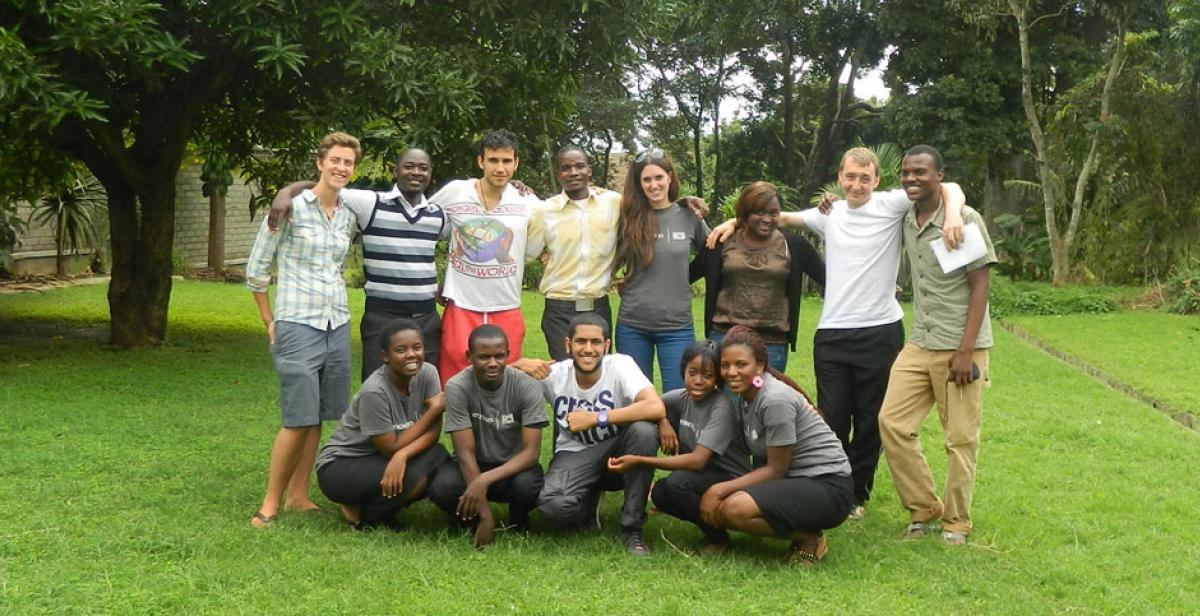The March – June placement is the second team of Progressio’s International Citizen Service (ICS) volunteers to continue to lead on the project in Mulanje district under wildlife and Environmental society of Malawi (WESM) in partnership with Mulanje Mountain Conservation Trust (MMCT).
It’s April and the group of volunteers, aka ‘Team Sapitwa’, have encountered a large East African sporadic mountain zone, Mulanje Mountain, which is considered the hardest mountain in the region, with the steepest slopes being on the Chambe side and the highest peak known as Sapitwa. It has been protected by the forest reserve since 1927, boasting one of highest levels of biodiversity with over 250 endemic species. The Mountain is commonly known to play an important role in the livelihoods of the communities that surround it, however the Malawians of Mulanje still need knowledge and awareness of the issues that threaten it.
Team Sapitwa has hit the ground running in helping the Mulanje communities to think green in our first two weeks in placement. We will be coordinating with local youth groups in the surrounding area of Mulanje in activities such as awareness campaigns, support in growing tree nurseries and advice on waste management, as well as educating young people on tough subjects like HIV and AIDS. Our first awareness campaign starts on Tuesday and is spreading awareness about the effects and impact of HIV and AIDS.
Here is a little introduction on the youth groups we will be working with:
Nansambe youth group
We met Nansambe youth group located in Ngwezu village. The projects that the youth group is undertaking are environmental conservation programmes where they plant trees along the rivers, roads and some encroached areas of the mountain. They also conduct HIV and AIDS and gender awareness campaigns.To sustain themselves they have a fish pond from which they generate some income. They also hope to have their own tea plantation running by the end of this year so as to generate more money. As a youth group they face a number of challenges one of which is demotivation from the people in the community, undermining of their work.

Chidziwitso youth club
`The youths are the drivers of the world, we can decide to change the world or not’ a quote from a 16 year old Jessica who was inspired by Janet James to join Chidziwitso a youth club in Chisutu village. They are involved in social services i.e. cleaning around the communities, market areas and hospitals. They also advocate for girls who dropped out of school because of pregnancy to continue their education. They are also involved in environmental conservation as they have a nursery and a woodlot at the backyard of their office.

Tigwilane Manja youth club
We also encountered Tigwilane Manja in Nessa village. The youth group mainly focuses on restoration of the environment primarily of trees that had been destroyed by flash floods that occurred in the area in 2011. They have registered a 90 percent survival rate of the trees that had been planted so far and are looking forward to reach greater heights. The members of the group applauded the youths of the area that when it comes to environmental issues but bemoaned them on issues of contraceptives and HIV and AIDS where the youths side-line themselves and just leave it for the women and the married people.

Chigonjetso youth club
Chigonjetso means victory, this youth group was formed by Arnold James who likes to be referred as terminator! The main issues this group tackles is getting children back to school as there are many children who are pushed towards marriage at an early age. The group are also big on equality, they show the women the jobs that men typically do and the same goes for the men. Their income is low. They were awarded a youth building for planting trees and sustaining them. The building is very basic with no electricity, no tables and no chairs, just walls and a roof. They are also big on the issue of human rights and environmental conservation awareness. They have 24 members all together with six women and 16 men typically around the ages of 15 and 25 although a few members are 12 years of age. The group don’t have many activities in place so supporting them with new equipment could be a good idea.

By ICS volunteers Harry Maganga and Andrew Hines



